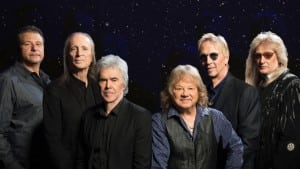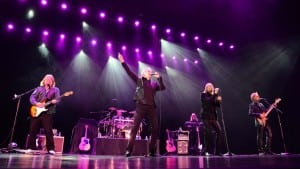Catch Three Dog Night at The Coach House Nov. 5 where fans can expect nothing but the hits (“The set takes off like a rocket and just keeps going. It’s like Bam! Bam! Hit! Hit! Hit!”).
Concert Guide Live caught up with Danny Hutton, founding member and lead singer of Three Dog Night, the day after the Rock and Roll Hall of Fame’s 2017 nominees were announced. Once again, Hutton’s group, who have been eligible for induction since 1993, have been passed over. Like many other artists who have been snubbed, Hutton claims indifference, though a tinge of bitterness comes through.
“I could not care less,” he explained. “I don’t need any of those guys to validate me. Who picked this committee? Come on. We’ve done so many gigs where Hall Of Fame people open for us. I know our value.”
And what exactly is that value? Try 21 consecutive Top 40 hits, 12 gold albums, three #1 hits “Mama Told Me Not To Come,” “Joy To The World,” and “Black & White”, the launching of numerous careers for songwriters like Randy Newman and Harry Nilsson, and one wine-loving bullfrog named “Jeremiah”. Between the absurdly prolific and creative years of 1969 and 1974, no other group had more top 10 hits, or was selling out bigger crowds.
When Hutton first moved to LA’s Laurel Canyon neighborhood in the 60’s, it was as a songwriter for Hanna Barbera Records. He had a minor hit with, “Roses and Rainbows,” and ingratiated himself in the canyon scene, a non-stop party, wilder than anything in “Mama Told Me Not To Come.” Hutton even hung out with John Lennon and Harry Nilsson during their infamous “lost weekend,” and shared a street with the era’s biggest stars.
“Stephen [Stills] and Neil [Young] were neighbors and Neil would come over and play stuff for me, that’s when they were doing Buffalo Springfield. I kind of knew David Crosby, he was a little bit crazy [laughs], Roger McGuinn, Mark Vollman [of The Turtles] lived up the street, Joni Mitchell was down the street with Graham [Nash], Mickey Dolenz lived next door, so it was quite a vibe.”
It was during this time that Hutton met Chuck Negron and Cory Wells, and the “three” of Three Dog Night was born. Releasing their first album in 1968, the band found their niche as expert interpreters of other songwriters’ work. “One” by Harry Nilsson became a signature song, “The Loner” was given to Hutton by Neil Young, “Bet No One Ever Hurt This Bad,” helped draw some attention to a young Randy Newman, and “It’s For You” breathed new life into a cast-off by a little duo called Lennon-McCartney.
“Some people used to really irritate me when they would say, ‘Well you covered a lot of people,’ insinuating that we’re just a cover band,” Hutton said. “I used to call it resurrecting songs. Harry Nilsson had his album out and ‘One’ didn’t do anything. So we came along and resurrected it, put our spin on it, and made it a hit.”
The group’s significant skill with creative arranging, expert song choice, incredible genre versatility, plus their transcendent live performances won them legions of fans, and the hits kept rolling in. In spite of all their success, or more accurately, because of it, the persnickety music press turned their collective noses up at Three Dog Night, focusing on the lack of original songwriting or “commercial” aspect of the group. This attitude was portrayed most famously in the band’s 1972 cover story for Rolling Stone, penned by Ben Fong-Torres. Other than the Hall of Fame question, this is the only other time Hutton gets riled up.
“The hit piece! That bastard, I hate his effing guts! Years later, he wrote his book, and he talks about how they said, ‘Well this is one of the biggest groups in the world right now, so how can we get ‘em? How can we nail them?’ It’s all about management, all of this crap, and they never sit and really talk to us about music. It’s a big hit piece and I hate the asshole. That’s not being a good journalist.”
Good journalism or not, it clearly sticks in Hutton’s craw, a scuff on all those shiny, gold records. One thing that can’t be tainted is the passion Hutton still has for performing. At 74, Hutton does around 80 shows each year with original guitarist Michael Allsup and a tight band of veterans. Cory Wells, who passed unexpectedly last year, has been replaced by the fabulous David Morgan, a choice Hutton attributes to fate.
“It was so serendipitous. Cory was having back problems, so he said, ‘Do the gigs, let the promoters know I won’t be there, and get a substitute. I recommend this guy, David Morgan. The cat’s fabulous, he can do it.’ And Cory was gone within two weeks. So that’s how he came in, through Cory. He’s incredible as a person, his work ethic, his voice, he just fits right in.’
Someone who still doesn’t quite fit into the lineup is the estranged Chuck Negron, who was barred from touring with the group due to his addiction. He has since recovered, and Hutton bears him no ill will, just don’t expect to see them onstage together anytime soon.
“It would be like asking a guy about his ex-wife when the guy’s happily married to a new wife,” Hutton said. “1986, how long ago was that? That’s the last time we worked together. We’ve both moved on. I don’t want to denigrate him at all. He went through a really tough time and I’m very happy and proud for him that he got out of that addiction. Very few people come back from that.”
Unlike some other groups, Hutton is happy to rest on his laurels. He’s got 21 hits, a beloved catalogue, sold-out shows with one of the best bands around, and couldn’t care less that he has to play “Shambala” night after night.
“You’re not there to please yourself,” Hutton expressed. “You’re there to please your audience. You’re not selling out, you’re selling tickets. This sell-out crap, get over it. There’s nothing better than happy faces walking out the door going, ‘Wow!’ We’re there to suspend time for an hour and a half. I don’t want to talk about politics, I want people to be transported to a whole different time and place, be uplifted, and say, ‘Oh my God it’s over already? That was so short!’ That’s what we want to do.”

